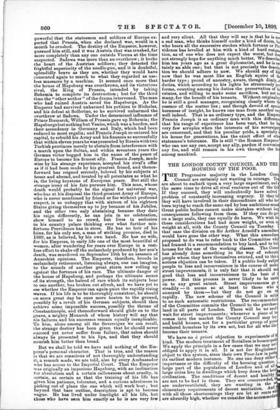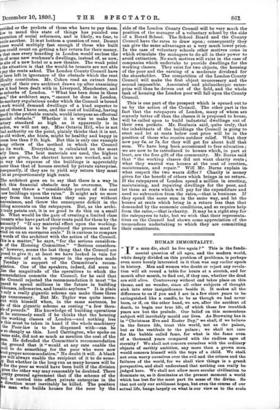THE LONDON COUNTY COUNCIL AND THE HOUSING OF THE POOR.
THE Progressive majority in the London Conn Council are certainly not wanting in courage. Th are about to embark upon a very large experiment, and the same time to drive all rival ventures out of the fief If they succeed, they will undoubtedly have solved problem of constantly increasing urgency. If they f they will have involved in their discomfiture all who ha been trying to reach the same end by less ambitious me Great public bodies cannot make mistakes without is consequences following from them. If they can do g on a large scale, they can equally do harm. We wish t these considerations had had more weight, or even weight at all, with the County Council on Tuesday. that case the division on Sir Arthur Arnold's amendme would have gone the other way. What this amendme proposed to do was to refer back to the Committee whit had framed it a recommendation to buy land, and to bni houses for the use of the working classes. The Conn has already done something in the way of rehoui people whom they have themselves evicted, and to this serious objection can be taken. If a public body subje people to loss and inconvenience in the course of mak street improvements, it is only fair that it should no good that loss and inconvenience to the best of i power. But this process is never likely to be cam on to any great extent. Street improvements go steadily — it seems so at least to those who annoyed by them— but they do not go on V rapidly. The new scheme of the Council is subj to no such automatic restrictions. The recommendati of the Committee commits the Council to the purchase land in all parts of London. There will be no need wait for street improvements ; whenever a piece of la comes into the market the County Council may buy and build houses, not for a particular group of per rendered homeless by its own act, but for all who like become their tenants.
We have no a priori objection to experiments of t kind. The modern treatment of Socialism is homceopo We apply the principle in a few cases that we may not obliged to apply it in all. It is not for Englishmen object to this system, since their own Poor-law is per its earliest modern instance. No one can deny either importance or the difficulty of the housing question. large part of the population of London and of all large cities live in dwellings which keep down the level civilisation. The conditions of decent and healthy' are are not to be had in them. They are overcrowded, are underventilated, they are wanting in the in elementary requirements of decent sanitation. And with all these shortcomings they are let at rents 111, are absurdly high, whether we consider the accommoda
•
rovided or the pockets of those who have to pay them. Low to mend this state of things has puzzled one eneration of social reformers, and is likely, we fear, to uzzle another. It is at bottom a question of rent. Decent ouses would multiply fast enough if those who built tiorn could count on getting a fair return for their money. p that case every hoarding in London would enclose the [te of some new workmen's dwellings, instead of, as now, site of a new hotel or a new theatre. The weak point the situation is that the would-be tenants are not able pay the rents asked. The London County Council have t been left in ignorance of the obstacle which the rent ifaculty constitutes. Mr. Cohen read an extract from report of their own architect drawn up after examining w it had been dealt with in Liverpool, Manchester, and e suburbs of London. " What has been done in these es," the architect says, " cannot be done in London. e sanitary regulations under which the Council is bound work would demand dwellings of a kind superior to oat of those I have seen, and the cost of building, having Bard to the probable rentals, would interpose an effectual uncial obstacle." Whether it is wise to make the itary standard so high as it apparently is in radon, we will not say. Miss Octavia Hill, who is not bad authority on the point, plainly thinks that it is not. e old widow, she hints, might be healthy and happy in room less than 9 ft. high. But this is only one example ong others of the method in which the Council s its work. Everything is calculated on the most tly lines. The best materials are used, the highest ges are given, the shortest hours are worked, and in 's way the expense of the buildings is appreciably ter than that of houses erected by private enterprise. nsequently, if they are to yield any return they must let at proportionately high rents.
The architect goes on to say that there is a, way in ich this financial obstacle may be overcome. The until may throw a. "considerable portion of the cost new buildings upon the rates." It might ask no more ney from the tenants than they can pay without 'nvenience, and throw the consequent deficit in the ding accounts on the ratepayers. But, as the archi- t truly points out, it is no good to do this on a small e. What would be the gain of creating a limited class tenants who have part of their rents paid for them by the munity ? "If any material effect upon the working- s population is to be produced the process must be 'ed on on an enormous scale." It is curious to compare words of the architect with the action of the Council. is is a matter," he says, "for the serious considera- of the Housing Committee." " Serious considers, ," however, seems the last thing that the Council are °Bed to give it ; at least we have looked in vain for evidence of such a temper in the speeches made Tuesday in support of the Committee's recom- dation. One of the speakers, indeed, did seem to e the magnitude of the operations to which the mmendation commits the Council, for he said that e Council rejected the recommendation it must " be pared to spend millions in the future in building khouses, infirmaries, and lunatic asylums." It is plain t only a really gigantic scheme can make these three ga unnecessary. But Mr. Taylor was quite incon- ent with himself when, in the same sentence, be e of this gigantic scheme as costing "a few thou- s of pounds." His knowledge of building operations be extremely small if he thinks that the housing the working classes of London—and nothing less this must be taken in hand if the whole machinery the Poor-law is to be dispensed with—can be e so cheaply as this. Lord Carrington, who spoke on same side, did not so much as mention the cost of the me. He defended the Committee's recommendation the ground that it " would at any rate enable the fled to do something for the poor who were now out proper accommodation." No doubt it will. A blank sae will always enable the recipient of it to do some- g. But whether in the long run as many houses will be t for the poor as would have been built if the division gone the other way may reasonably be doubted. There Pretty general agreement that if the scheme of the "cif is carried into effect private enterprise in the direction must inevitably be killed. The position 'e man who builds houses for the poor by the side of the London County Council will be very much the position of the manager of a voluntary school by the side of a Board School. The School Board and the County Council have the rates to draw upon ; consequently they can give the same advantages at a very much lower price. In the case of voluntary schools other motives come in which stimulate the managers to do all in their power to avoid extinction. No such motives will exist in the case of companies which undertake to provide dwellings for the working classes. They exist for two objects, the housing of the poor and the earning of a moderate dividend for the shareholder. The competition of the London County Council will make the first object unnecessary and the second impossible. Associated and philanthropic enter- prise will thus be driven out of the field, and the whole task of housing the London poor will fall upon the County Council.
This is one part of the prospect which is opened out to us by the action of the Council. The other part is the fact that the ratepayers of London, many of whom are scarcely better off than the classes it is proposed to house, will be called upon to build industrial dwellings out of their own pockets. Mr. Boulnois said, quite truly, that the inhabitants of the buildings the Council is going to erect and let at rents below cost price will be in the position of those who receive outdoor relief. What they now pay 6s. or 7s. for they will get for about half that sum. We have long been accustomed to free education ; we are now to be introduced to houses which, in part at least, are the free gift of the community. Mr. Burns said that " the working classes did not want charity rents ; what they wanted was houses at the cost of erection,. maintenance, and repair." Will Mr. Burns explain in.. what respect the two wants differ ? Charity is money given for the benefit of others which brings in no return.. If the ratepayers of London spend a million in erecting,.
maintaining, and repairing dwellings for the poor, and let them at rents which will pay for the expenditure and need no subvention from the rates,—that is business. If they spend the same sum in the same way, and let the- houses at rents which bring in a return less than that demanded by the economic conditions, and so require help from the rates,—that is charity. It may be a right step for the ratepayers to take, but we wish that their representa- tives on the Council had shown some appreciation of the tremendous undertaking to which they are committing their constituents.











































 Previous page
Previous page